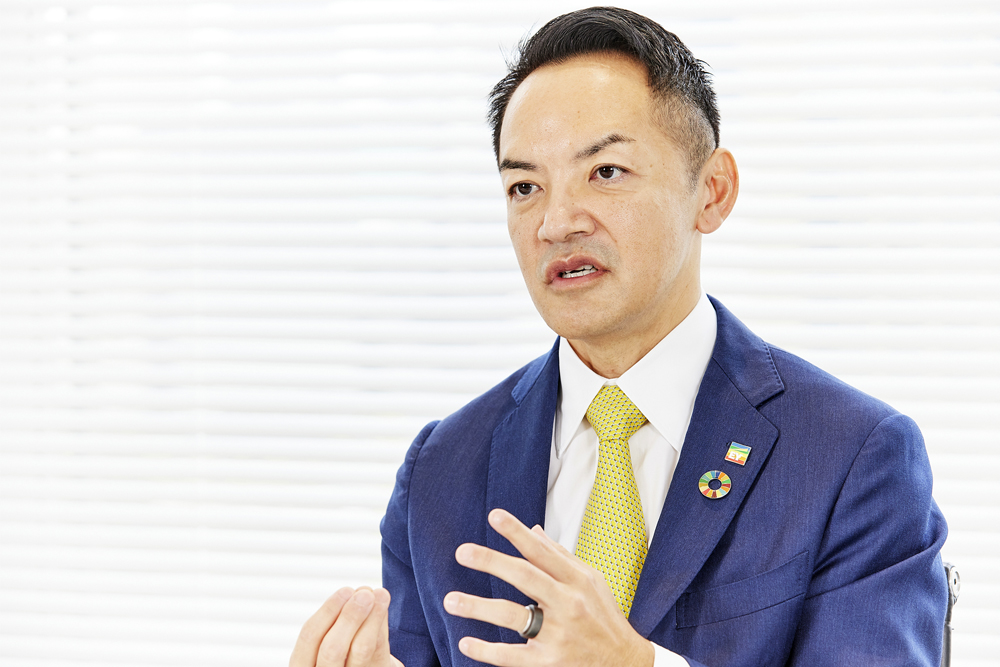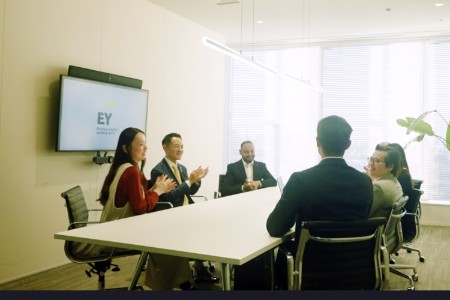
Section 1
Leveraging people value to drive the delivery of high-quality services and the creation of long-term value
In a time of increasingly rapid changes and rising volumes of information, how do we decide what is relevant?
We are faced daily with a variety of challenges, including climate change and other sustainability issues, ongoing inflation and accompanying increases in interest rates, as well as the conflicts in Ukraine and Israel/Palestine. In addition, although we have finally emerged from the COVID-19 pandemic, the infrastructure and systems for diverse work styles are still not fully in place, and the demands and expectations of each generation are changing.
We are also witnessing advances in technology, such as generative AI, that are significantly transforming the world. Human rights, defamation via social media, and the spread of fake news are also pressing issues which we cannot overlook. From my own perspective, I am troubled that there is limited consensus about sharing the same fact-based information about the real world.
To give one example, a start-up company that develops grocery bags and other products using sustainable raw materials to replace plastics has long complained about problems with recycling waste. However, information on why recycling still remains a challenge is not reaching people. To change people’s behavior and move to a sustainable society, we need to broaden the range of information that people receive and to promote mutual understanding through dialogue.
I believe that we can help build understanding and share information from various perspectives. This is why we are implementing EY Ripples, a corporate responsibility (CR) program. We launched the program in 2018 with the goal of positively impacting the lives of one billion people worldwide by 2030 in order to contribute to the achievement of Sustainable Development Goals (SDGs). The program has three focus areas: supporting the next generation workforce to develop mindsets and skills to find and sustain meaningful work; working with impact entrepreneurs; and accelerating environmental sustainability. Initiatives conducted as part of the program have included an endowed course on human capital management at Aoyama Gakuin University Graduate School, a lecture series on purpose-driven management and on sustainability management at the Graduate School of Management, Kyoto University and at Hitotsubashi University Graduate School, respectively.

Section 2
Creating long-term value for clients and society as a whole and achieving our purpose
EY’s business is diverse. Professionals in various fields such as accounting/auditing, finance, tax, legal, HR strategy, technology, M&A, and sustainability work together with our clients on a day-to-day basis, leveraging the strength of our global network.
Although the knowledge and skills of our people covers many areas, we all share a common belief in the importance of “Trust and Confidence.” All of our pre-contract reviews question whether there are any factors that could affect the trust placed in us and whether we will be able to bring long-term value (LTV) to society through the provision of high-quality services.
Reviewing our progress in FY2023, Assurance delivered stable performance as the market grew. Tax, Consulting, and Strategy and Transactions also achieved significant growth, providing high value-added services while pursuing transformation in various areas. EY Global registered revenue of US$49.4 billion (up 14.2% on the previous year), to reach a record high. EY Japan, meanwhile, recorded revenue of JP¥194.87 billion, an increase of 12.3% over the previous year.
At EY, we have a worldwide, shared purpose: Building a better working world. This purpose, which is owned and lived by all our people, has guided us for over a decade since 2013 and is supported by a clear expression of our ambition. While our purpose refers to “why” we exist, our ambition describes “what” we should do to achieve our purpose. We believe it is essential to create long-term value for our people, our clients, society, and the financial health of EY.
Each of our people also places priority on bringing value to clients and society as a whole for the long term. One of the main characteristics of our people is that they thoroughly identify not only events in front of them, but also the potential challenges that lie ahead, and take the time to improve value for our clients and society over the long term.

Moriaki Kida
EY Japan Chairperson & CEO
Japan Regional Managing Partner

Section 3
Even in a society where the use of generative AI is becoming more prevalent, people are still the key to delivering high-quality services
To earn society’s trust, it is important not only to offer new ideas and advice that leads to innovation, but also to continue providing high-quality services at all times.
For us, quality is the basis for value.
Nevertheless, the reality is that innovation emerging from technology can bring with it new and previously unimaginable risks. To maintain high-quality services while responding flexibly to those risks requires investment and an evolution of professional expertise.
There is some discussion that the proliferation of cutting-edge technology will replace the types of jobs currently performed by human beings. However, I am convinced that work itself will not disappear, even if labor-saving technologies do change the way that people engage with their work. People are still the key to providing high-quality services.
We believe that the growth of each person at EY is a source of value creation. To encourage their growth, EY provides them with many opportunities to learn on their own initiative. For example, the EY Tech MBA and EY Masters in Sustainability offered in partnership with Hult International Business School are free of charge and open to all our people. This fiscal year, 274 people across EY were awarded the EY Tech MBA or Master’s degree. We also have EY Badges, an in-house certification program which helps EY people to gain skills in data science, AI, leadership, and many other areas, and to apply them in their careers and in society.
Promoting diversity, equity, and inclusiveness (DE&I) is a prerequisite for creating teams that fully draw out individual abilities and achieve great results. The Diverse Abilities Center (DAC) is one example of an initiative in this area. The DAC aims to improve the employment and work conditions of neurodiverse talent with a diagnosis of a mental or developmental disability. It enables employees to experiment with flexible working styles suited to their needs while also developing their careers and acquiring specialized skills. EY Japan has been praised for this initiative and was named DE&I Champion of the Year at the British Chamber of Commerce in Japan’s British Business Awards 2022. In addition, as part of the activities of Unity, an EY network for LGBT+ people and their allies, we set up a booth at Tokyo Rainbow Pride 2023, with 150 EY people taking part in the event. In the PRIDE Index, an indicator for corporate LGBT+ initiatives, we picked up the Rainbow award for the second consecutive year, and earned the Gold award, the top rating, for the sixth straight year. There is also WindS, a network for all women working at EY Japan. It seeks to create an environment in which female personnel can play active roles, and believes that three tasks must be accomplished for women to thrive in their work: expand the female footprint, create an environment conducive to continued working, and provide support to help women rise to higher levels. Its activities include providing career education to junior and senior high school students, formulating personnel measures, and conducting training to change attitudes. EY Japan was ranked 8th overall in Nikkei Woman magazine’s 100 Best Companies Where Women Actively Take Part, and has now made the top 20 for two years in a row.
Although the yen has weakened recently, a review of trends data for Japanese companies over the past 30 years reveals dramatic changes. For example, the share of overseas sales in total sales at listed Japanese companies is now close to 40%.* Companies need to fully understand the needs of consumers not only in Japan but also abroad to avoid risks that could have a significant impact on sales.
As the number of foreign nationals working for Japanese companies is expected to increase, there is a growing need for people who do not have some Japanese heritage or background to join the management ranks of these corporations, as well as for talent management and career systems to support them. In response to these changing times, we intend to offer a wide range of support to review the various systems in Japanese society that are the foundation for the Japanese companies that operate around the world.
As professionals, and with our people and our purpose as the starting point, we will work alongside our clients and other stakeholders to build a better society. As a consequence, we will squarely confront the risks posed by environment, geopolitics, and rapid technological advances, and work to resolve social issues with the perspective of creating long-term value.
* Source: Questionnaire survey data on foreign direct investment in Japan Bank for International Cooperation, Survey Report on Overseas Business Operations by Japanese Manufacturing Companies (34th Survey, 2022)
Press release
Our latest thinking
Summary
At EY, we enhance the value of our people who deliver client services, which in turn helps improve the corporate value of our clients. Building on the foundations of our respect for diversity, equity and inclusiveness as well as the fundamentals of our people and purpose, we are committed to solving societal issues by addressing head-on both environmental and geopolitical risks and the rapid pace of modern technological advances, partnering with our clients and other stakeholders to continue to build a better working world.


